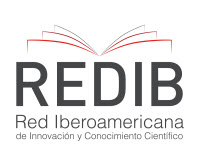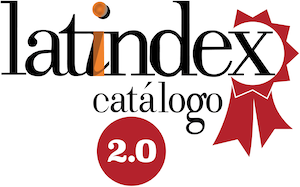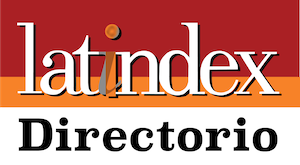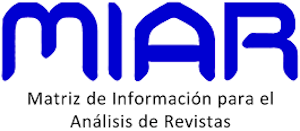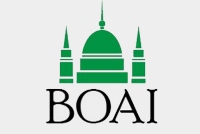Decision-making in the human development bond in Ecuador
DOI:
https://doi.org/10.32645/13906925.1260Keywords:
conditional cash transfers, poverty, decision-making , ethics, leadership, social programs , Latin AmericaAbstract
In this article, the decision-making process and ethical dimension in the implementation of conditional cash transfer programs in Latin America are analyzed, with a particular focus on Ecuador’s Human DevelopmentBonus (BDH), the largest program of its kind in the region.
These programs have a short-term strategy to alleviate poverty through cash transfers and a long-term strategy to promote investment in human capital through conditions related to health and education, as well as fostering entrepreneurship through BDH advances. The decisionmaking process in the implementation of these programs is influenced by leadership theories
such as transformational, situational, charismatic, and transactional leadership, taking into account psychosocial factors and the importance of leaders in the success or failure of these policies. Although there are impact assessment reports in countries such as Mexico, Colombia, and Brazil that analyze similar outcomes, the lack of analysis on decision-making and ethics in these programs is emphasized. In summary, this article provides a comparative analysis of decision-making and ethics in conditional cash transfer programs, with a focus on Ecuador’s BDH, within the context of Latin America.
References
Aristiguieta, A. (1998). Introducción a la gerencia pública. Gerencia de Publicación y Relaciones Interinstitucionales. Publicaciones internas de la Contraloría General de la República de Venezuela.
Attanasio, O., Battistin, E., Fitzsimons, E., Mesnard, A., & Vera-Hernández, M. (2009). How effective are conditional cash transfers? Evidence from Colombia. Fiscal Studies, 30(3-4), 297-328. https://doi.org/10.1111/j.1475-5890.2009.00091.x
Bass, B. M. (1985). Leadership and performance beyond expectations. New York: Free Press.
Behrman, J. R., & Hoddinott, J. (2005). Program evaluation with unobserved heterogeneity and selective implementation: The Mexican PROGRESA impact on child nutrition. Oxford Bulletin of Economics and Statistics, 67(4), 547-569.
BID. (2014). Los bonos de desarrollo humano de Ecuador. Banco Interamericano de Desarrollo.
Bouckaert, C. P. (2011). Public Management Reform. Ben Press.
Brecher, M. (1969). A framework for Research in Foreign Policy Behavior. Journal of Conflict Resolution, 75-101.
Chávez, C. A., González, N., & Rosero, J. (2017). Impacto de la transferencia monetaria condicionada en la nutrición y la salud infantil: el caso del Bono de Desarrollo Humano en Ecuador. Revista Latinoamericana de Desarrollo Económico, 27, 129-157.
Conger, J. A., & Kanungo, R. N. (1987). Toward a behavioral theory of charismatic leadership in organizational settings. Academy of Management Review, 12(4), 637-647. https://doi.org/10.5465/amr.1987.4306715
Cornelis, K. (2007). Pensamiento estratégico. Editorial Prentice Hall.
Cortina, A. (1996). Ética de la empresa, claves para una nueva cultura empresarial. Editorial Trotta.
Easton, D. (1965). A systems analysis of political life. John Wiley and Sons, Inc.
Fiszbein, A., & Schady N, R. (2009). Conditional Cash Transfers: Reducing Present and Future Poverty. World Bank Policy Research Report.
Franciskovic, J. (2013). Retos de la gestión Publica: presupuesto por resultados y rendición de cuentas. Journal of Economics, Finance and Administrative Sciences, 28-32.
Gunther, R. (2014). La toma de decisiones, cómo obtener los resultados esperados. Financial Times Press.
Hammond, J. S., Keeney, R. L., & Raiffa, H. (2015). Smart choices: A practical guide to making better decisions. Harvard Business Review Press.
Hersey, P., & Blanchard, K. H. (1988). Management of organizational behavior: Utilizing human resources (5th ed.). Prentice-Hall.
Hofstede, G. (2001). Culture’s consequences: Comparing values, behaviors, institutions, and organizations across nations. Sage publications.
Huencho, V. F. (2012). Innovación en la Toma de Decisiones: La Gestión por Resultados como Herramientas de Apoyo a los Directivos Publicos. Revista Chilena de Administración Pública, 81-101.
Janis, I. L., & Mann, L. (1977). Decision making: A psychological analysis of conflict, choice, and commitment. Free Press.
Kahneman, D., & Tversky, A. (1979). Prospect theory: An analysis of decision under risk. Econometrica, 47(2), 263-292.
Kahneman, D. (2011). Thinking, fast and slow. Macmillan.
Klein, G., Calderwood, R., & Clinton-Cirocco, A. (2016). Rapid decision making on the fireground: An introduction to the literature review. US Forest Service, Pacific Northwest Research Station.
Lerner, J. S., & Keltner, D. (2000). Beyond valence: Toward a model of emotion-specific influences on judgement and choice. Cognition and Emotion, 14(4), 473-493.
LindBlom, D. B. (1963). A strategy of decision. The Free Press.
Llinás, R. (2002). El cerebro y el mito del yo. Grupo Editorial Norma.
Ludeña, C., Carpio, C., & Luzuriaga, J. (2016). Impacto del programa de transferencia monetaria condicionada en la calidad de vida de los hogares beneficiarios: el caso del Bono de Desarrollo Humano en Ecuador. Instituto de Investigación en Desarrollo y Sostenibilidad (IIDYS), Universidad Nacional de Loja
Makón, M. P. (2000). El modelo de gestión por resultados en los organismos de la administración pública nacional. In V Congreso Internacional del CLAD (pp. 24-27). Santo Domingo.
March, J. G., & Simon, H. A. (1958). Organizations. Wiley
Martinez, D., Borja, T., Medellin, N., & Cueva, P. (2017). ¿Cómo Funciona el Bono de Desarrollo Humano? Washington: Banco Interamericano del Desarrollo.
Maryer, K. O. (2012). Pensamiento Estratégico para la Gestión Publica: Una Confluencia sobre la Planificación, Organización, Dirección y Control. COEPTOM.
Moreno, R. C., & Minor, R. R. (2017). Responsabilidad Social y Ética Profesional en la Gestión de la Administración Pública y Empresarial. Pensamiento & Gestión.
OCDE. (1995). Governance in Transition. Public Management Reforms in OECD Countries. OCDE.
Ochoa, H. (2008). Innovación de la gestión pública en Venezuela. Revista Venezolana
Pérez, D. (2004). El ambiente de pensamiento estratégico de la gerencia postmoderna. España: Trotta.
Schady, & Rosero. (3 de 7 de 2008). Are Cash Transfers Made Women Spent Like Other Source of Income. Recuperado el 27 de 7 de 2018, de http://elibrary.worldbank.org/doi/pdf/10.1596/1813-9450-4282
Simon, H. A. (1955). A behavioral model of rational choice. The Quarterly Journal of Economics, 69(1), 99
Singer, P., & Hardin, G. (2007). Ethics of Global Development: Agency, Capability and Deliberative Democracy. Cambridge: Cambridge University Press.
Skoufias, E., Davis, B., de la Vega, S., & López-Calva, L. F. (2010). Impact evaluation of Mexico’s conditional cash transfer program. The World Bank.
Richard C. Snyder, H. W. (1963). Foreign Policy Decision Making. American Journal of Sociology, 195-196.
Snyder, R. (1963). La génesis de las decisiones como enfoque del estudio de la política Internacional. En Snyder, Teorías contemporánea de las Relaciones Internacionales. Ed. Tecnos Madrid.
SPROUT., H. S. (1990). “Teorías en Pugna en las Relaciones Internacionales”. Buenos Aires: Ed. Gel.
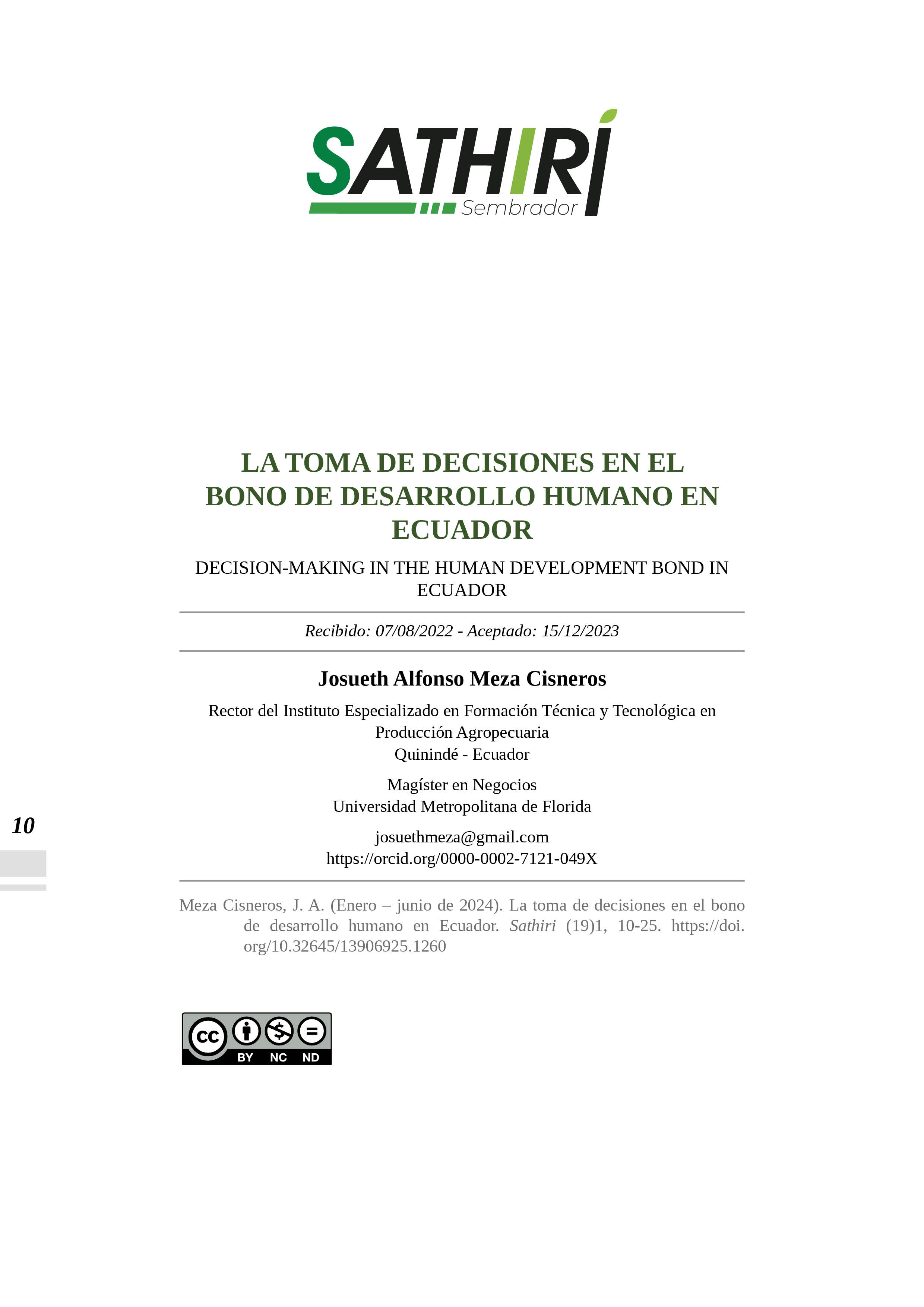
Downloads
Published
Issue
Section
License
Copyright (c) 2024 Josueth Alfonso Meza Cisneros

This work is licensed under a Creative Commons Attribution-NonCommercial-NoDerivatives 4.0 International License.
El autor mantiene los derechos morales e intelectuales de su obra, autorizando a la editorial de la revista Sathiri la difusión y divulgación de su contenido con fines estrictamente académicos y de investigación, sin fines de lucro. Así mismo, se autoriza que la obra sea descargada y compartida con otras personas, siempre y cuando no sea alterada y se reconozca su autoria.






